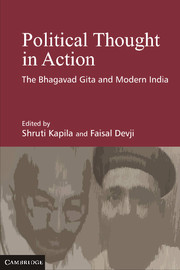Book contents
- Frontmatter
- Contents
- List of Contributors
- Acknowledgements
- Introduction
- 1 India, the Bhagavad Gita and the World
- 2 The Transnational Gita
- 3 The Transfiguration of Duty in Aurobindo's Essays on the Gita
- 4 Gandhi's Gita and Politics as Such
- 5 Gandhi on Democracy, Politics and the Ethics of Everyday Life
- 6 Morality in the Shadow of Politics
- 7 Ambedkar's Inheritances
- 8 Rethinking Knowledge with Action: V. D. Savarkar, the Bhagavad Gita and Histories of Warfare
- 9 A History of Violence
- Index
3 - The Transfiguration of Duty in Aurobindo's Essays on the Gita
Published online by Cambridge University Press: 05 January 2014
- Frontmatter
- Contents
- List of Contributors
- Acknowledgements
- Introduction
- 1 India, the Bhagavad Gita and the World
- 2 The Transnational Gita
- 3 The Transfiguration of Duty in Aurobindo's Essays on the Gita
- 4 Gandhi's Gita and Politics as Such
- 5 Gandhi on Democracy, Politics and the Ethics of Everyday Life
- 6 Morality in the Shadow of Politics
- 7 Ambedkar's Inheritances
- 8 Rethinking Knowledge with Action: V. D. Savarkar, the Bhagavad Gita and Histories of Warfare
- 9 A History of Violence
- Index
Summary
Aurobindo Ghose had spent his childhood in England safely insulated from Indian influences. There he had received a classical education, studied on scholarship at King's College, Cambridge, and gone on to stand for the Indian Civil Service examinations with great success—at least until the riding test, for which he failed to appear. Returning to India in 1893, he took up service under the Maharaja of Baroda, in western India, where he renewed the studies in Sanskrit and Bengali, and began his initial foray into anticolonial politics with the publication of a series of provocative essays in Bombay's Indu Prakash criticizing the Congress for its mendicant attitude towards the British rulers.
In 1905, India's first substantial attempt at mass mobilization emerged in response to the partitioning of Bengal into two separate provinces by the British. The ostensible reason for the partition was administrative convenience, but critics were quick to point out that there was no reason, other than divide-and-rule manipulation, not to have created new administrative units out of the large non-Bengali populations incorporated into the Bengal Presidency (in Bihar and Orissa) rather than splitting Bengal proper down the middle. The partition provoked a broad-based condemnation from all the major sections of the predominantly Hindu educated middle and upper classes of Bengali society, sparking calls for a boycott of British manufactures and concerted support for indigenous (swadeshi) products in their stead. Aurobindo responded to the Swadeshi crisis by returning to Calcutta, and emerged as a key organizer and articulate press publicist, both in Bengal and nationally, of the “Nationalist” or “Extremist” faction of the Swadeshi movement.
- Type
- Chapter
- Information
- Political Thought in ActionThe Bhagavad Gita and Modern India, pp. 48 - 65Publisher: Cambridge University PressPrint publication year: 2013



